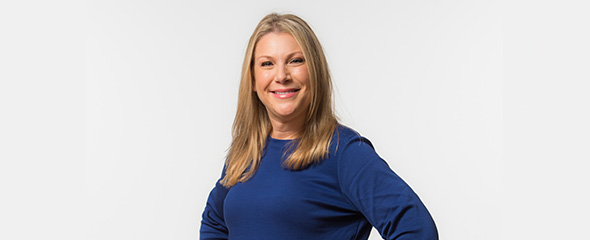Amazing stories: Evy Libien

When Evy Libien’s 65-year-old mother was diagnosed with stage 4-breast cancer, the then 30-year-old new mom felt compelled to find out her risk of developing the disease.
“My mother’s diagnosis was devastating to me. It made me think about my family and me. My son was just six months old at the time, and my husband and I wanted to have more kids,” Evy recalls. “I went to my OB/GYN and asked her to prescribe the mammogram to make me feel safe.”
The mammogram showed no sign of breast cancer, but during a thorough physical breast exam, a nurse practitioner felt a lump under Evy’s left armpit. Following a biopsy and sonograms, she was told she had breast cancer.
“The primary tumor was in my breast, but it didn’t show up in the mammogram because it was small,” she says. Though high-quality screening mammograms are the best way to screen for breast cancer, it is not foolproof. On occasion, a breast change, such as a lump, can be felt but not show up on a mammogram. These changes can be especially tough to spot in younger women. That is why women of all ages should have their breasts examined every year by a trained healthcare professional. Finding breast cancer early is critical to preventing the spread of the disease, which improves overall survival rates.
“I had a double mastectomy, which was done at my local hospital in Englewood, and the doctors were great but being so close to the city, I wanted to go into the city to get a second opinion,” Evy recalls. “My sister-in-law, who is a doctor, recommended my mother see Dr. Hershman at NewYork-Presbyterian/Columbia after she was diagnosed. So I knew that’s where I wanted to go as well.”
Dawn L. Hershman, MD, is a prominent breast cancer specialist in New York. She is the leader of the Breast Cancer Program of the Herbert Irving Comprehensive Cancer Center, which is one of 49 National Cancer Institute-designated comprehensive cancer centers in the United States.
Dr. Hershman enrolled Evy in the ongoing adjuvant clinical trial. Used in conjunction with surgery or radiation therapy, adjuvant has been shown to decrease the chance of a cancer recurrence.
“Dr. Hershman said to me, ‘You’re young, so we want to be as aggressive as possible. Would you be interested in joining the study?’ I said, 'absolutely' because I wanted to be as vigilant as I can,” Evy remembers.
Evy and her mother underwent medical genetic testing at NewYork-Presbyterian to determine if inherited gene mutations played a role in their cancer diagnosis. It was determined Evy and her mother had the BRCA1 gene mutation. Evy also had triple-negative breast cancer.
The BRCA1 genes help repair damaged DNA to stabilize the cell’s genetic material. Women who inherit specific mutations of the BRCA1 gene are at an increased risk of developing breast and ovarian cancer. Triple-negative breast cancer does not have the genes for estrogen receptors, which meant Evy could not undergo hormone therapy or medication.
“Because I have the BRCA gene I have a higher chance of ovarian cancer,” she says. “I always wanted a bigger family. I kept asking Dr. Hershman if she thinks I can have more children. She told me, ‘do your treatment, and when you’re a couple of years out of treatment you can try.’”
So Evy waited. About two and a half years after her initial diagnosis, she had her second son.
“It took me a little while to get pregnant—about nine months. I went to fertility specialists and even went to a doctor who specialized in acupuncture for fertility,” she says. “Dr. Hershman was incredibly supportive of doing the naturalistic medicine in conjunction with the traditional medicine. She was very open-minded. She’s a very research-based physician, so she read about different research studies on the benefits of holistic medicine for fertility.”
Now with two sons, Evy still felt like her family wasn’t complete. She again discussed the prospect of having another child with Dr. Hershman.
“I always wanted to have at least three kids. I asked if I could do this again. She said to me, ‘you have to promise me by time you’re 37 you’ll get an oophorectomy,’” Evy says.
For women with the BRCA1 mutation, like Evy, the lifetime ovarian cancer risk is estimated to be between 35 and 70 percent. That is compared to a 2 percent risk estimated for women in the general population. Having an oophorectomy—removal of one or both of the ovaries—significantly reduces the odds of developing ovarian cancer or recurrent breast cancer.
“I was able to have another child two years later. I now have three boys,” she says.
Just two months after giving birth, at age 36, Evy underwent an oophorectomy at NewYork-Presbyterian/Columbia. Not long after her surgery, Evy’s mother died from the breast cancer.
“When I think about my experience, it’s a great story because I was able to have children and have my mom with me for those seven years,” she says. “I feel like it’s so important to tell my story because there are so many younger women being diagnosed with breast cancer. It can feel like your life is ending because you think you won’t be able to have more kids and complete your family. But I was able to move on.”
To learn more about the breast cancer program at NewYork-Presbyterian, please visit nyp.org/cancer. To find an oncologist, please call 877-697-9355.


